Canadians have less income mobility than they’ve had in decades as fewer people move up the income ladder — and even fewer move down.

A Statistics Canada analysis of decades of income trends found that relative income mobility — how you’re doing compared to everyone else — is shrinking, and is well below what it was in the 1980s and 1990s.
IN DEPTH: Canadians’ financial instability trap
Fewer Canadians are switching income brackets today than at any point since 1982: Between 1985 and 1990, three-quarters of Canadians changed deciles; between 2007 and 2012, only two-thirds did.
When people do move up or down the income ladder, they don’t move as far as they used to.
Fewer are seeing real income growth, and the growth they’re seeing is at its lowest rate since 1997.
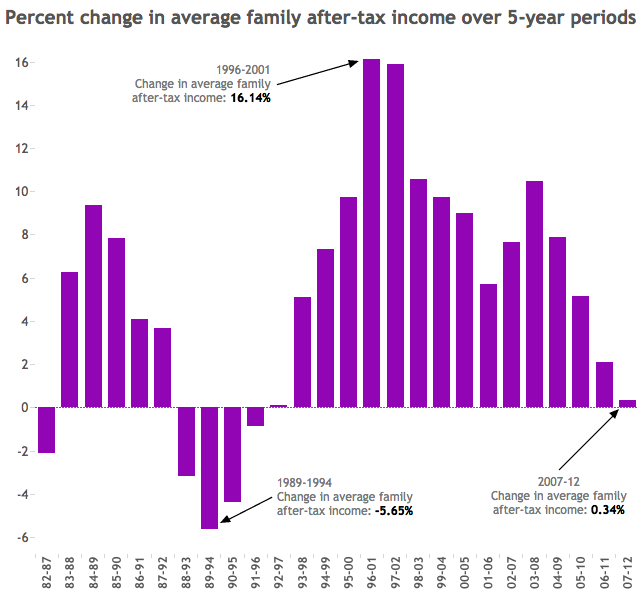
The lowest-earning Canadians are seeing their rate of income growth drop to its lowest point since 1995.
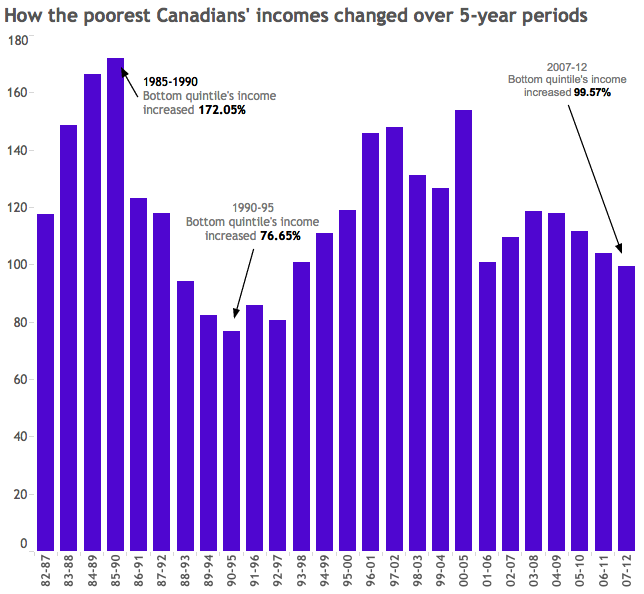
Study author Xuelin Zhang compares it to running a marathon: Absolute mobility is your running time. Relative mobility is where you place.
Absolute mobility is steady: You’re still running that race a bit faster every five years.
But Canadians’ ability to overtake other runners, to change where they fall in that marathon, “that’s become weaker over time,” Zhang said.
“It’s getting harder for people to get ahead, in that sense.”
The highest-earning people in Canada stay in that richest tranche; the lowest-earning people stay in the bottom bracket.

Get weekly money news
As anyone discussing their “personal best” race time will tell you, absolute mobility is important: If you earn enough to pay for your needs, you should be fine.
But income immobility means Canadians have a harder time overcoming income inequality.
READ MORE: Canada’s wealth gap widens
“When you have a reasonable level of income mobility … inequality could be reduced,” Zhang said.
“So anyone concerned about inequality, when they see mobility become slower, they would become concerned.”
Zhang’s data series ends with 2012 tax filings. But from what he’s seen the trend hasn’t changed.
READ MORE: When you’re income-rich, but asset-poor
Blame globalization. And technology. And a labour economy shifting faster than any institution can adapt.
“Each new cohort of young people entering the labour market has started with a lower starting wage and with a slower progression of earnings,” says University of Ottawa economist Miles Corak.
And not having much formal education has become much more of a barrier.
“The labour market is a lot harder on those who aren’t completely tooled up,” Corak said.
“It’s also a more risky place. … Big chunks of the bottom 40 per cent have basically stagnated as a result.”
Income strata are calcifying elsewhere: It’s more extreme in the U.S.; less so in Germany.
The more people earning different amounts live in different worlds, and the harder it becomes to travel between those worlds, the more frustrated people can become, Corak said.
READ MORE: Canadians who earn the least pay the most for a home
One example is disaffection-fuelled Republican candidate Donald Trump, he said.
“All parents aspire to see their children do as well as they possibly can, to make progress over time. And, to some extent, mobility reflects this notion of the benefits of growth,” he said.
“And if that’s not happening then we might, in a political sense, sort of wonder about the costs parts of society have paid.”
“That movie is playing out in the United States.”
READ MORE: The more women lean in, the more unequal their pay
There’s no easy way to make it easier for people to move between income rungs, Corak says. But governments can at least buttress the lower end of the ladder.
“Anything that increases the bargaining power of people at the lower end of income distribution is a good thing,” he said.
Making it easier to re-train or update skills would help. Initiatives like the Temporary Foreign Worker program, he argues, “cut the wrong way.” They can depress wages and employment standards, paying low amounts to people with limited recourse, on the assumption they aren’t sticking around.
READ MORE: The case for taking ‘temporary’ out of Temporary Foreign Worker
“But the other thing you have to do is accept that the nature of work has changed tremendously. And you really can’t pour too much sand into the gears of globalization and computerization,” Corak said.
“We live in a more risky world, and so we should foster public programs that give people the security they need.”
Canada’s employment insurance program, which is applied very disparately depending where in Canada you live, is ripe for reform, Corak said.
READ MORE: 5 things to know about changes to EI
Last fall, 93 per cent of unemployed Newfoundlanders were on EI, compared to 35 per cent in B.C. and 29 per cent in Ontario.
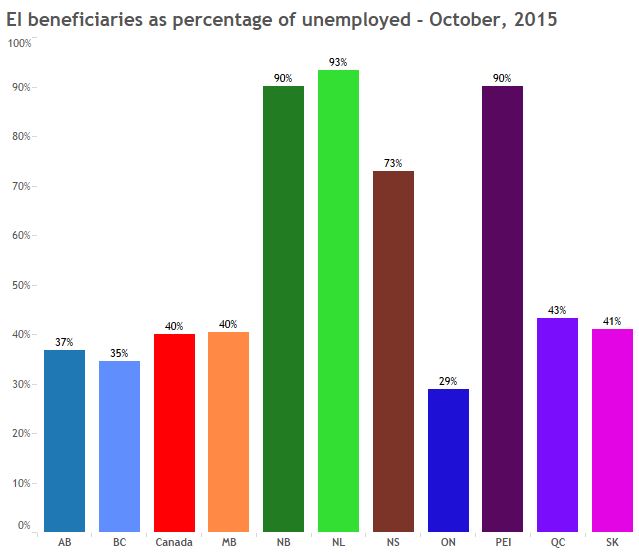
Labour pain in Alberta’s oilpatch has heightened pressure on the federal government to drastically reform EI.
One of the most effective ways to preserve wealth inequality is to pass it on to your kids.
“As this generation retires, some of them are going to be really well-to-do and pass a good deal of resources on to their children. Others aren’t going to have that option,” Corak said.
“So you have to sort of think about fairness in the tax transfer system, particularly around intergenerational transfers.”
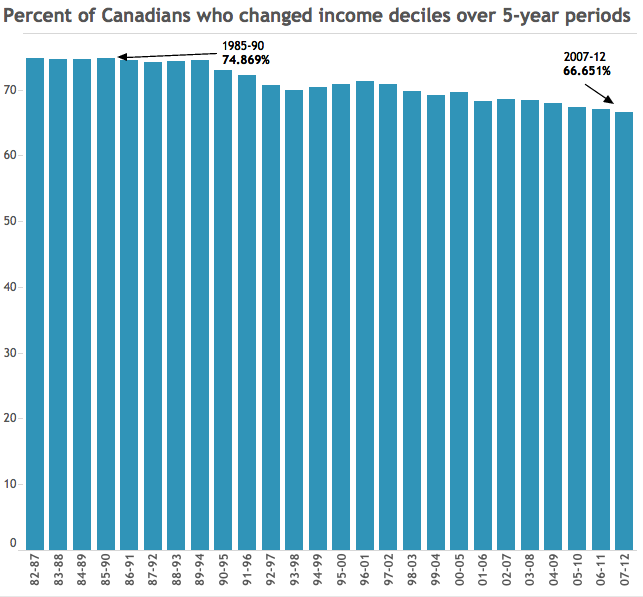
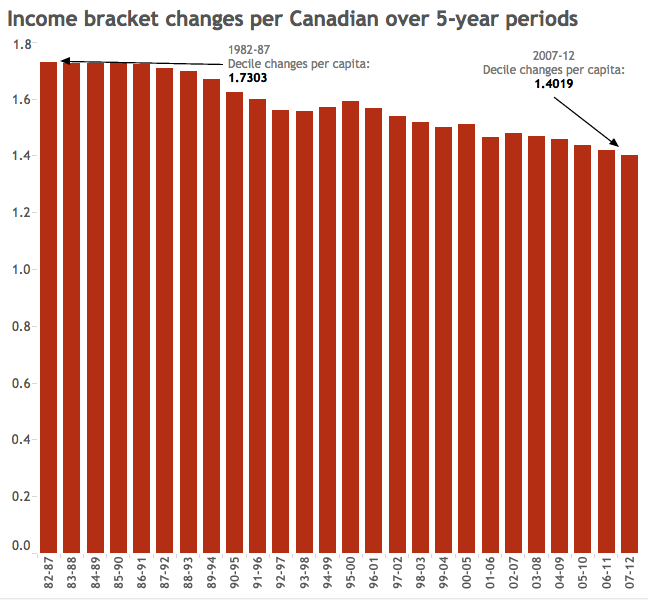








Comments